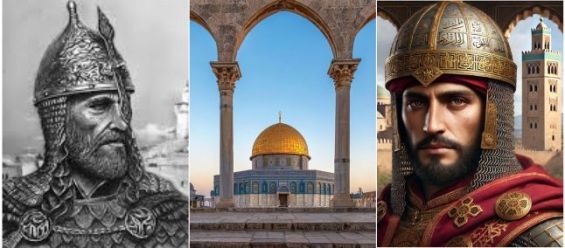The question of whether the Moroccan Almohad Sultan Yaqub al-Mansur provided military support to Salah al-Din al-Ayoubi (Saladin) in his battles against the Crusaders during the 12th century has long been a subject of historical debate. Historians have grappled with conflicting accounts and narratives, some suggesting that Yaqub Al-Mansur sent a fleet to assist Saladin after an initial refusal, while others argue the Almohad ruler ultimately declined to lend the requested support.
This article will provide an in-depth examination of the available evidence from a wide range of medieval historians and chroniclers, as well as insights from modern scholars, to assess the competing narratives around this intriguing question.
Saladin's entreaty for assistance
To understand the actions of Yaqub al-Mansur, we must first examine the circumstances that led Saladin to seek his aid. Numerous historical sources recount how Saladin, in the midst of his prolonged struggle against the European Crusaders, found himself in a precarious situation besieged by Frankish forces (led by the allied kings Richard the Lionheart of England and Philip II Augustus of France) in the port city of Acre «Akka» in august 1189 Ad.
 A memorial to the Moroccan Sultan Yaqub al-Mansur al-Muwahidi at the Pitti Por Museum in Florence, Italy. Under his picture is written: «From the shores of the Atlantic Ocean to the lands of Sicily. On the shores of the Tyrrhenian and Adriatic Seas I defended the Muslim control over the European lands...and Italy and Spain still tremble at the sound of my name».
A memorial to the Moroccan Sultan Yaqub al-Mansur al-Muwahidi at the Pitti Por Museum in Florence, Italy. Under his picture is written: «From the shores of the Atlantic Ocean to the lands of Sicily. On the shores of the Tyrrhenian and Adriatic Seas I defended the Muslim control over the European lands...and Italy and Spain still tremble at the sound of my name».
Thanks to the prestige of the Almohad empire and especially its powerful fleet, exceptional in the Mediterranean and considered one of the most powerful in the world at the time, the caliph Yaqub al-Mansur was solicited by Saladin. The Ayyubid sultan sent the Almohad caliph a request for aid consisting of sending a fleet that would block the Strait of Sicily to the passage of Christian armies and counter the ravages of the Franks on the coasts of the Holy Land. Saladin had entrusted the embassy to Marrakech, led by Abd Al-Rahman ibn Munqid.
The 13th-century historian Ibn Khallikan provides one of the earliest accounts of Saladin's appeal in his celebrated biographical dictionary «Wafayat Al-Aeyan» («Deaths of Eminent Men»). He writes:
«Saladin al-Ayoubi in the midst of his struggle against the Crusaders, when he was besieging the Franks who were in turn besieging the Muslims in Acre, appealed to the Moroccan king Yaqub al-Mansur and actually sent a delegation asking him to supply some of his naval ships».
This narrative is echoed by the 16th-century Maghrebi historian al-Maqqari in his work «Nafh Al-tayyeb» (The Breath of Perfume). He quotes Ibn Khallikan's passage and adds that Saladin's envoys arrived bearing gifts for the Almohad sovereign. Al-Maqqari states that the delegation «arrived in Morocco and found al-Mansur in al-Andalus, so they awaited him in the city of Fes until his arrival. They met him, delivered the message of Saladin».
The 19th-century Moroccan chronicler Abu al-Abbas Ahmed ibn Khalid al-Nasiri al-Salawi provides further details on the timing and itinerary of Saladin's embassy in his multi-volume history «Al-Istiqsa Li Akhbar Dowal Al-Maghrib Al-Aqsa» (Investigation into the News of the Dynasties of the Far West 'Morocco'). Al-Nasiri reports that after making the pilgrimage to Mecca in 586 AH (1190 CE), Saladin's envoy made his way to the Maghreb, arriving in Marrakesh in early 587 AH. From there, he traveled north to meet Yaqub al-Mansur in Fes in Jumada al-Awwala/July of that same year.
These accounts firmly establish that Saladin did indeed reach out to his Almohad counterpart for naval support at a critical juncture in his war against the Crusaders. The response he received, however, remains a matter of dispute.
 Portrait of Sultan Saladin
Portrait of Sultan Saladin
Conflicting narratives : Did Al-Mansur provide aid ?
In examining the historical record, two competing narratives emerge regarding Yaqub al-Mansur's response to Saladin's appeal. Some sources indicate that the Almohad caliph responded and dispatched ships to assist in the fight against the Crusaders, while others argue he didn’t provide the requested aid.
The most direct attestation that Al-Mansur changed course and sent a fleet to support Saladin after initially declining comes from the great 14th-century Maghrebi scholar Ibn Khaldun. In his monumental world history «Kitab Al-Ibar» (The Book of Lessons), Ibn Khaldun writes:
«It is said that after that [initial refusal] he outfitted one hundred and eighty ships, and prevented the Christians from [attacking] the Levant coasts».
This exact phrasing is repeated almost verbatim in al-Nasiri's «Al-Istiqsa», suggesting he likely relied on Ibn Khaldun's earlier report. The 20th-century Lebanese historian Philip Hitti and his co-authors also recount this claim in their extensive «Tarikh Al-Arab» (History of the Arabs), stating: «After that, he equipped a fleet of one hundred eighty pieces to prevent the Christians from reaching the Levant shores».
In the same vein, medieval expert Professor Dominique Valérian asserts, based on the testimony of the Genoese archives: «It is noted that in 1190 no Genoese contract was drawn up for a destination in the Maghreb, which could be explained by a closure of the Almohad ports to Christians, or at least to the Genoese who were then participating in the Third Crusade».
This archival evidence, lends credence to the notion that Yaqub al-Mansur took concrete steps to hinder the movements of the Crusaders.
The jurist Ibn Khallikan goes so far as to affirm that the Almohad sultan would be buried in Beqaa Valley, south of Lebanon, echoing a legend to which the historian Ahmed al-Maqqari Tlemcani brings a formal denial. While almost certainly apocryphal, the persistence of such stories underscores the strong association between Yaqub al-Mansur and the conflicts in the Levant in the popular imagination. A shrine claimed to be the tomb of the Almohad Sultan of Morocco, Yaqub al-Mansur, in the Bekaa Valley of Lebanon.
A shrine claimed to be the tomb of the Almohad Sultan of Morocco, Yaqub al-Mansur, in the Bekaa Valley of Lebanon.
The counter-narrative : al-Mansur rebuffed Saladin
A fair number of historians suggest that Yaqub al-Mansur stood firm in his refusal to commit forces to aid Saladin. The earliest explicit reference to the Almohad ruler declining the Ayyubid delegation's request comes from Ibn Khallikan, who states that al-Mansur «did not supply the help sought from him».
Writing in the 13th century, the Moroccan chronicler Abd al-Wahid al-Marrakushi makes no mention of any Almohad assistance to Saladin in his biographical dictionary «Al-Moajib Fi Talkhis Akhbar Al-Maghrib» (The Astonishing in Summarizing the News of Morocco). While not definitive proof of a refusal, this omission by a contemporaneous local source is noteworthy.
Later Maghrebi historians reaffirm this version of events, providing additional context for al-Mansur's decision. In «Nafh Al-tayyeb», al-Maqqari quotes a passage indicating that the sultan was displeased by Saladin's failure to address him with his preferred title. He writes:
«[al-Mansur] found that it avoided addressing him as 'Commander of the Faithful'. He was displeased by that and kept it to himself, treated the messenger generously, sent him back to the one who dispatched him, and did not respond to his request».
This narrative subsequently spread beyond the confines of the Maghreb, being recorded by the Syrian historian Abu Shama al-Maqdisi in his 13th-century chronicle of Saladin's reign, «Kitab Al-Rawdatayn Fi Akhbar Al-Dawlatayn» (The Book of the Two Gardens Concerning Reports of the Two States). Abu Shama corroborates al-Maqqari's report, writing, «The help requested from the sultan of Morocco did not materialize. I was informed that it weighed on them that he [Saladin] did not address him as Commander of the Faithful, as was their custom».
Some modern academic scholarship have also accepted this version of events as well. In the aforementioned «Tarikh Al-Arab», Philip Hitti and his colleagues also mention this version of the story, «Since Saladin recognized the authority of the Abbasid caliphs, his messenger did not address Abu Yusuf [Yaqub al-Mansur] as Commander of the Faithful, but called him Commander of the Muslims. This offended Abu Yusuf al-Mansur, and he did not respond to his [Saladin's] request».
Geopolitical tensions between Almohads and Ayyubids
Apart from the question of how Saladin addressed the Almohad caliph in his correspondence, a number of chroniclers point to the strained relations and military tensions between the two states as a possible reason for al-Mansur's alleged refusal to render aid.

Ibn Khaldun provides crucial background information on this dynamic. Prior to reaching out for assistance, he says, Saladin had dispatched his nephew Taqi al-Din and the commander Sharf al-Din Qaraqush at the head of a Turkmen army to lead an expedition to conquer territory in the east Maghreb (Modern-day Libya). Their goal was to «have a stronghold to entrench himself from the pursuit of Nur al-Din bin Zanki, lord of Syria», from whom Saladin had effectively usurped power in Egypt.
According to Ibn Khaldun's account in «Kitab Al-Ibar», Qaraqush succeeded in capturing the city of Tripoli and surrounding areas, proclaiming the authority of Saladin and Taqi al-Din and bringing them formally under Ayyubid control. He then forged an alliance with the Banu Ghaniya, a rival clan that had previously supported the overthrown Almoravid dynasty and engaged in protracted warfare with the Almohads across the Maghreb. United in their opposition to Almohad rule, the Ayyubid commander and his Banu Ghaniya allies conducted raids and skirmishes against Yaqub al-Mansur's forces.
The 13th-century Moroccan historian Abd al-Wahid al-Marrakushi, who witnessed many of these events firsthand, provides additional details on the political and military impact of Qaraqush's campaigns. In his chronicle «Al-Muajib Fi Talkhis Akhbar Al-Maghrib», he writes, «When news of Qaraqush and his allies among the Arabs and Banu Ghaniya in the eastern Maghrib reached him, the Caliph Yaqub was about to defeat Alfonso VIII, the king of Castile, and return Toledo to Muslim hands. The only thing that led him to accept a truce was the news about Ibn Ghaniya's activity in Ifriqiya with the Ayyubid Qaraqush».
Al-Marrakushi goes on to say that Yaqub Al-Mansur «met great hardship in the war against Qaraqush and his allies, and made many sacrifices to suppress their movement. They defeated him at first and scattered his army, but he attacked them again and was able to defeat them and eliminate their movement».
This disruptive incursion by Saladin's subordinates had major ramifications for the Almohad Caliphate. Not only did it compel al-Mansur to abort a potentially decisive campaign against the Christians in al-Andalus, but subduing the Ayyubid-Banu Ghaniya axis required an extensive diversion of Almohad forces and resources. In the view of several modern historians, this episode was probably a major contributing factor in the caliph's later supposed refusal to commit his fleet to aiding Saladin directly.
Moroccan scholar Abdelmajid Ben Jelloun leans towards the second narrative. Referencing the conflict on the Almohad eastern frontier, Ben Jelloun claims in his book «Hadi-hi Murrakush» (This Is Marrakesh) : «If al-Mansur had moved too close the Mediterranean Sea, as his fleet was one of the strongest Islamic fleets, it would have been possible to change the course of Arab history».
Saladin's court was not oblivious to how this earlier invasion might be perceived by the Almohads. In «Kitab Al-Rawdatayn», Abu Shama al-Maqdisi quotes a letter from Saladin's chief minister al-Qadi al-Fadil to Yaqub al-Mansur, coaching the Ayyubid envoy Ibn Munqidh on how to respond if questioned about Qaraqush's actions.
«The two slaves [Qaraqush and Yuzba] and those with them are not among the leading Mamluks and princes, nor among the counted eunuchs and saints, but their market has stagnated, and they were followed by mobs like them. They are not among those who, if absent, are brought forward, nor are they capable of harm, nor perpetrating an offense that would give rise to a complaint of a crime. God forbid that we should command an evildoer to work corruption in the land. I intend nothing but reform, as far as I am able».
Despite this attempt to distance Saladin from his commanders' actions, the sources make clear that their invasion and collusion with al-Mansur's enemies had seriously damaged relations between the Ayyubid and Almohad states. This lingering acrimony and mistrust, more than a dispute over titles, was propably a key factor behind Yaqub al-Mansur’s supposed rejection of the Ayyubid ruler’s request for support, according to proponents of the second narrative.
Moroccans of Jerusalem : Descendants of volunteers or the army of Yaqub al-Mansur ?
Amid the two conflicting historical narratives, it is impossible to definitively determine whether the official Moroccan state at the time, «the Almohad state» led by Sultan Yaqub al-Mansur, sent forces to support Saladin. What is certain is that Moroccans participated alongside Saladin in the liberation of Jerusalem, as confirmed by the testimony of most historians and by Saladin himself ; after defeating the Crusaders and conquering Jerusalem. The Moroccans wanted to return to their homeland, but Saladin asked them to stay and granted them a plot of land in Jerusalem known as Harat al-Maghariba (razed in 1967 after the Six Day War). In this context, he said his famous quote :
«I have settled here those who stand firm on land and strike forcefully at sea, and they are the best people to be entrusted with Al-Aqsa Mosque and this city».
 Morocco Gate in the Old City of Jerusalem, named after the Moroccans who lived in the Moroccan Quarter " Harat al-Maghariba " that was destroyed in 1967
Morocco Gate in the Old City of Jerusalem, named after the Moroccans who lived in the Moroccan Quarter " Harat al-Maghariba " that was destroyed in 1967
The descendants of those Moroccans who fought alongside Saladin still reside there. Several families enriched this district over the centuries, and their names testify to their Moroccan origins: the Filali (from Tafilalet), the Alami (from Jbel Allam), the Serghini (from Sraghna), the Meslouhi (from Tameslouht), and others.
The remaining question is whether the ancestors of the Moroccans in Jerusalem, who fought alongside Saladin, came as volunteers, or if they were the same 180 warships reportedly sent by al-Mansur to aid Saladin. Given the two conflicting narratives, as a reader, you can choose whichever account you find more plausible.
However, there is another possibility : Firstly, the number of Moroccans who fought with Saladin numbered in the thousands, to the extent that one account claims that 20% to 30% of Saladin's army at the Battle of Hattin were Moroccans. Such a large number makes it improbable that they all traveled to the East voluntarily. It necessitates the conclusion that jihad, which is equivalent to the «holy war» in Christianity, had been declared. It is well-known that the call for jihad, in Islamic history in general and Moroccan history in particular, could only be issued by the ruler of the Muslims—the Sultan.
There are countless examples of this in Moroccan history. Most of the major battles in Morocco's history such as : Battle of Sagrajas (1086), Battle of Alarcos (1195), Battle of las navas de tolosa (1212), and the Battle of Wadi al-Makhazin (1578) and other significant battles, could not have gathered such large forces except through the Sultan's call for mobilization and jihad.
Even the hypothesis that Al-Fukaha (clerics) could have independently declared jihad is implausible in this context. The Almohad dynasty was a centralized state that ruled all of North Africa (except for Egypt, the base of the Ayyubids) and exerted its influence over all parts of its kingdom. For example, the Almohads only entrusted the governance of the provinces of Tunis and Tripoli (far from their capital in Marrakech) to the Hafsid family of the Hintata tribe, because they belonged to the same tribal group as the Almohad rulers, the Masmuda tribe, which ensured their loyalty and control over those distant regions.
Thus, in this context, it would have been impossible for the clerics to declare jihad without the order or at least the approval of the ruling authority.
Secondly, Saladin's statement about the Moroccans, «They stand firm on land and strike forcefully at sea…» confirms that Saladin was aware of the Moroccans' naval capabilities at the time. This combat skill would have only been possessed by the soldiers of the Almohad fleet, as they had experience in naval confrontations with the Castilians and other Iberian kingdoms. The Almohad state provided them with the resources for shipbuilding and naval combat training, which further increases the likelihood of the accuracy of the first narrative—that Sultan Yaqub al-Mansur sent 180 ships loaded with equipment and supplies to aid Saladin.
From this perspective, it is most likely that the Almohad ruler Yaqub al-Mansur ordered assistance to Saladin, and although he initially refused, he later responded positively. This perspective reconciles the conflicting historical accounts and provides a compelling case for understanding the presence and role of the Moroccans who fought alongside Saladin in the liberation of Jerusalem and whose descendants still live there today.





 chargement...
chargement...













